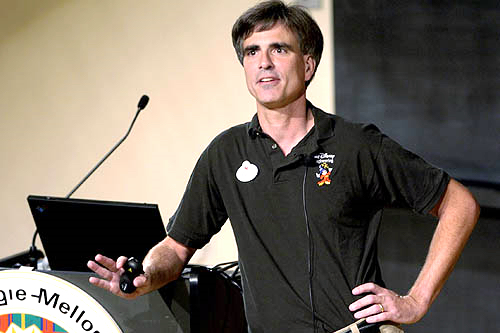Is Better than Failing without Trying
|
A friend of mine, Dave Wood, mentioned that my webpage is my diary. That comment's connotation rattled me. When I think of a diary, what jumps to mind is some preteen girl writing things in her diary and showing it the next day to her friends at school. However, I understand what Dave meant from a denotative definition, and he is correct. As I begin this essay, I am well aware that this article reflects precisely where I am on my yellow brick road of life, just like a diary. There is a strange nexus among three of my mentors, Don Quixote, Randy Pausch, and Teddy Roosevelt, and myself. Allow me a few paragraphs to explain. The first issue is tied to where the four of us were in our journeys on our yellow brick roads. All of us were nearing the end of our sojourn. Don Quixote is joisting with windmills late in life. Randy Pausch gave his Last Lecture nine months before dying due to metastasized pancreatic cancer. Teddy Roosevelt was shot by an assassin in 1912, but the bullet lodged in his chest for about a half dozen years. In 1919, the bullet moved, resulting in his death seven years after the attempt on his life. While I have every intention of outliving George Burns, which means I have another 26+ years, I have danced with death twice already. As much as I do to maintain my health by exercising, eating correctly, and seeing healthcare providers, I am aware that a betting person wouldn't put a lot of money on me reaching my 100th birthday and/or besting Burns by a couple extra months. Therefore, all four of us were quite familiar with dancing with death and/or the imminent reality of death. That experience of doing the dance radically changed our Weltanschauung (worldview) for the better. Don Quixote, the elderly knight-errant said that he'd march into hell on his quest. 
Don Quixote ready to march into hell....
Randy Pausch, while facing death within the year, was more alive than anyone in the audience listening to his Last Lecture. In Pausch's manner, he reinforces what Don Quixote believed. Pausch said, "Better to fail spectacularly than to do something mediocre." Pausch would at least want to try a noble quest, to use Don Quixote's terminology, in spite of the possibility of failure. 
Teddy Roosevelt's Man in the Arena speech blends Don Quixote and Randy Pausch.
Roosevelt's key is, in the process of the battles of life, to dare greatly. To be more clear and to avoid missing his message, he added, "...if he fails, at least fails while daring greatly, so that his place shall never be with those cold and timid souls who neither know victory nor defeat." 
All three of us were concerned about our legacy. What example are they leaving their family or the large human family? Pausch summed it up, "If we had to vanish tomorrow, what would we want as our legacy?" Be honest. Fight the good fight. Get involved in life and make the world better than how it was found. I am who I am today due to the nexus of my three mentors. They have shown me a new Weltanschauung. My drive concerning my legacy is one of the most critically important parts of who I am. I haven't won all the time. There are some gaping holes in my various quests in life. Trust me. I write this essay feeling the loss of many of my quests still today. Having said that, there is a freedom to failure. My children and grandchildren will remember me as driven, even though I have not always been successful. For example, I have written about my last words. Two of my neighbors, Chuck and Maureen, know the story behind my last words and that failed quest. Will a failed quest change any dashed dreams? No. Being the victor isn't in winning all the time; it is in trying all the time. If you think that I have spent hours writing this essay without pain, delete that from you mind. I really don't like dealing with dreams that could have been but aren't. Nevertheless, as Pausch stated, "Better to fail spectacularly than to do something mediocre." That is the legacy that I wish to leave my children, grandchildren, and those who have met me over the many decades. I'm proud of that legacy not because I was a victor but because I tried. As for you, my advice is to choose wisely when leaving a legacy.
Visit the On Seeing the Light page to read more about this topic.
Visit the Connecting the Dots page to read more about this topic.
Visit the The Last Lecture page to read more about this topic.
Visit the Dancing with Death page to read more about this topic.
Visit The Mentors and Me page to read more about this topic. 08/26/16 Follow @mountain_and_me |











